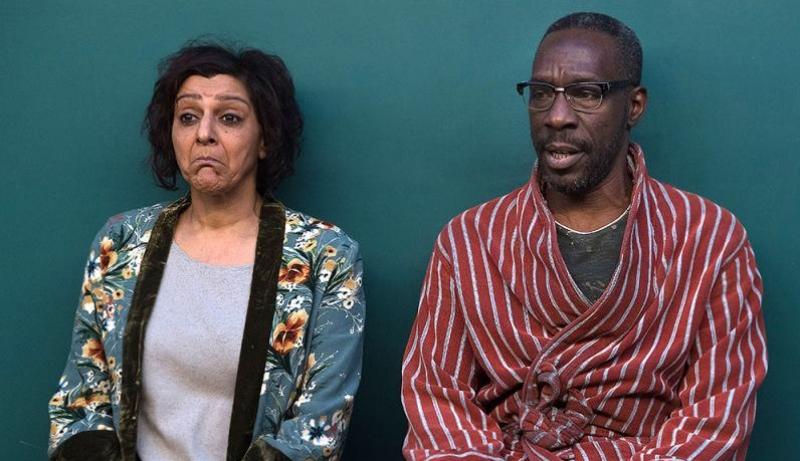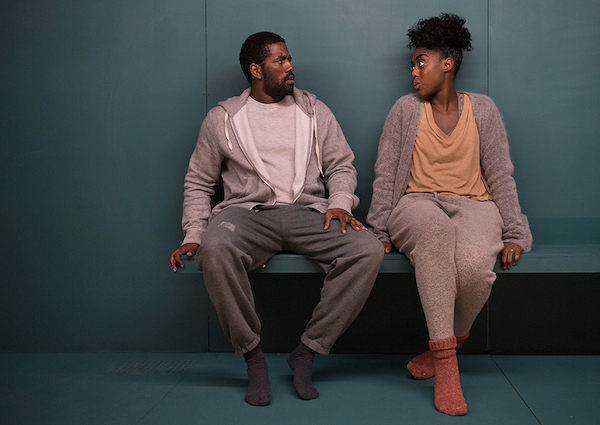A Profoundly Affectionate, Passionate Devotion to Someone (–noun), Royal Court Theatre | reviews, news & interviews
A Profoundly Affectionate, Passionate Devotion to Someone (–noun), Royal Court Theatre
A Profoundly Affectionate, Passionate Devotion to Someone (–noun), Royal Court Theatre
New play by debbie tucker green is too abstract for its own good

Love, we know, will tear us apart again. And again. And yet again. It will shred our nerves and rip through our guts; it will fill us with anguish, and then douse us in regrets. It will expose our weaknesses, and then make us say what we can never unsay. It will embattle our egos, and then stamp on our ids. It will. It really will.
I quickly got tired of going around in circles
The first thing you notice about it is the staging, in the Royal Court’s upstairs studio: the centre of the room is full of low black bar stools, which are hard and uncomfortable. Around three walls is a green platform, with a handful of seats, but no props. As they wait for the audience to file in, the actors draw circles and lines in chalk on the walls. Then two of them, a couple called A and B, start. In 14 short scenes they argue, full of recrimination and resentment, about their relationship. Time flips back and forth so some scenes show different emotions, most notably their joy in their newborn kids. And their rapport goes beyond the grave.
Then, in part two, another, older couple, Man and Woman, have a similar stand-off. They are in their dressing gowns, which suggests both domesticity and illness. She is very sick, but their mutual recriminations and renewed resentments swallow up their energies. The final part sees Man having an affair with Young Woman, who happens to be the daughter of A and B. In each of these three encounters, apologies are demanded, memories are twisted and a struggle for power strides up and down the playing space.
As you’d expect with love, the central issue is communication. The 80-minute piece is about what we say, and what we don’t say. About how we listen, or don’t. It’s about our need to be heard, and our unwillingness to hear. It’s about what we love about the other person, and what we’d like to change in them. If only we could. The cumulative effect is a kind of Sartrean feeling that hell is indeed other people. But without the philosophy. There’s an unspoken implication that every relationship is the same, that every love sinks in the same old shit. Green’s couples have the same highs and the same lows (mainly lows). The same emotional tangles and the same disappointments. The same exhaustion (greatly aided by the discomfort of the seating) and the same silences. The dialogues are tentative, bitty, repetitive, reiterative and rebarbative. The women are suspicious and the men are evasive. Since they talk about nothing but themselves the piece has the infernal intensity of complete solipsism. Despite green’s ability to write dialogue that is pointed and perceptive, I quickly got tired of going around in circles. And circles. And more circles. I longed for her characters to talk about something else: they never do.
Green’s couples have the same highs and the same lows (mainly lows). The same emotional tangles and the same disappointments. The same exhaustion (greatly aided by the discomfort of the seating) and the same silences. The dialogues are tentative, bitty, repetitive, reiterative and rebarbative. The women are suspicious and the men are evasive. Since they talk about nothing but themselves the piece has the infernal intensity of complete solipsism. Despite green’s ability to write dialogue that is pointed and perceptive, I quickly got tired of going around in circles. And circles. And more circles. I longed for her characters to talk about something else: they never do.
As directed by green herself, the play – however passionately felt – quickly gets tedious. In the first and longest part, Lashana Lynch (A) and Gershwyn Eustache Jnr (B) (pictured above) brilliantly portray a couple whose familiar wrangles, about talking and about sex, fit into a broader narrative of their lives. In the next two parts, the brevity of the exchanges between Man (Gary Beadle), Woman (Meera Syal) and Young Woman (Shvorne Marks) means that the actors don’t have much to really challenge them, and the other components of the production – from designer Merle Hensel to Christopher Shutt’s sound – are not exactly straining either. Syal manages to coax the maximum expressiveness from her lines, punctuating the exchanges with grimaces until she finally cracks, and looks like a little girl lost. But although the play has its moving moments as well as its insightful ones, it is too static – it fatally lacks a really satisfying story. It is the victory of the abstract over the dramatic.
rating
Explore topics
Share this article
The future of Arts Journalism
You can stop theartsdesk.com closing!
We urgently need financing to survive. Our fundraising drive has thus far raised £49,000 but we need to reach £100,000 or we will be forced to close. Please contribute here: https://gofund.me/c3f6033d
And if you can forward this information to anyone who might assist, we’d be grateful.

Subscribe to theartsdesk.com
Thank you for continuing to read our work on theartsdesk.com. For unlimited access to every article in its entirety, including our archive of more than 15,000 pieces, we're asking for £5 per month or £40 per year. We feel it's a very good deal, and hope you do too.
To take a subscription now simply click here.
And if you're looking for that extra gift for a friend or family member, why not treat them to a theartsdesk.com gift subscription?
more Theatre
 Ghost Stories, Peacock Theatre review - spirited staging but short on scares
Impressive spectacle saves an ageing show in an unsuitable venue
Ghost Stories, Peacock Theatre review - spirited staging but short on scares
Impressive spectacle saves an ageing show in an unsuitable venue
 Hamlet, National Theatre review - turning tragedy to comedy is no joke
Hiran Abeyeskera’s childlike prince falls flat in a mixed production
Hamlet, National Theatre review - turning tragedy to comedy is no joke
Hiran Abeyeskera’s childlike prince falls flat in a mixed production
 Rohtko, Barbican review - postmodern meditation on fake and authentic art is less than the sum of its parts
Łukasz Twarkowski's production dazzles without illuminating
Rohtko, Barbican review - postmodern meditation on fake and authentic art is less than the sum of its parts
Łukasz Twarkowski's production dazzles without illuminating
 Lee, Park Theatre review - Lee Krasner looks back on her life as an artist
Informative and interesting, the play's format limits its potential
Lee, Park Theatre review - Lee Krasner looks back on her life as an artist
Informative and interesting, the play's format limits its potential
 Measure for Measure, RSC, Stratford review - 'problem play' has no problem with relevance
Shakespeare, in this adaptation, is at his most perceptive
Measure for Measure, RSC, Stratford review - 'problem play' has no problem with relevance
Shakespeare, in this adaptation, is at his most perceptive
 The Importance of Being Earnest, Noël Coward Theatre review - dazzling and delightful queer fest
West End transfer of National Theatre hit stars Stephen Fry and Olly Alexander
The Importance of Being Earnest, Noël Coward Theatre review - dazzling and delightful queer fest
West End transfer of National Theatre hit stars Stephen Fry and Olly Alexander
 Get Down Tonight, Charing Cross Theatre review - glitz and hits from the 70s
If you love the songs of KC and the Sunshine Band, Please Do Go!
Get Down Tonight, Charing Cross Theatre review - glitz and hits from the 70s
If you love the songs of KC and the Sunshine Band, Please Do Go!
 Punch, Apollo Theatre review - powerful play about the strength of redemption
James Graham's play transfixes the audience at every stage
Punch, Apollo Theatre review - powerful play about the strength of redemption
James Graham's play transfixes the audience at every stage
 The Billionaire Inside Your Head, Hampstead Theatre review - a map of a man with OCD
Will Lord's promising debut burdens a fine cast with too much dialogue
The Billionaire Inside Your Head, Hampstead Theatre review - a map of a man with OCD
Will Lord's promising debut burdens a fine cast with too much dialogue
 50 First Dates: The Musical, The Other Palace review - romcom turned musical
Date movie about repeating dates inspires date musical
50 First Dates: The Musical, The Other Palace review - romcom turned musical
Date movie about repeating dates inspires date musical

Add comment